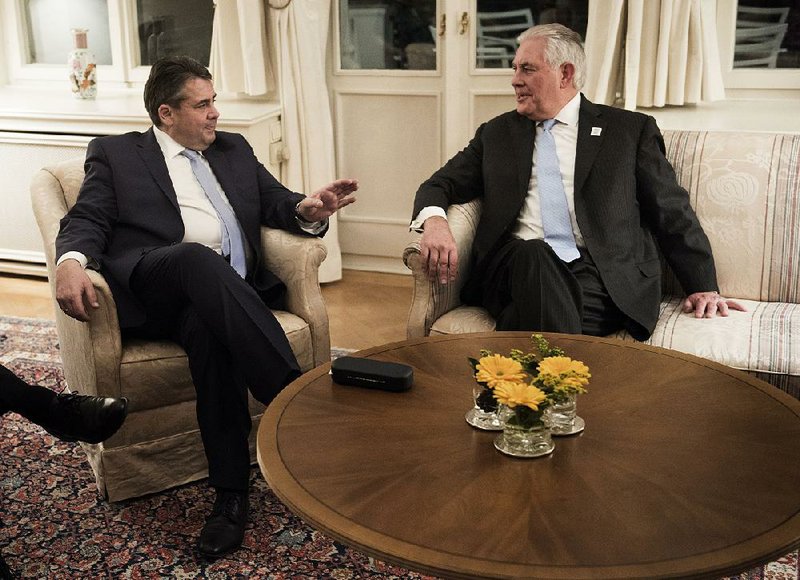BRUSSELS -- President Donald Trump's administration signaled Thursday that there will be no change soon in U.S.-Russia relations, putting the onus on Moscow to prove itself if it wants closer cooperation with Washington. Russia's support for Ukrainian separatists was underscored as a test case of its willingness to change behavior.
RELATED ARTICLES
http://www.arkansas…">Trump condemns leaks http://www.arkansas…">New U.S. travel ban on the way http://www.arkansas…">Eateries, schools shut as immigrants protesthttp://www.arkansas…">Health care overhaul outlined http://www.arkansas…">Israel-envoy pick apologizes for insults, vows to changehttp://www.arkansas…">White House budget chief sworn in http://www.arkansas…">U.N., Arab bloc: 2 states favored http://www.arkansas…">With FHA rate cut off, Trump's policy for housing blurry http://www.arkansas…">Northwest Arkansas students miss school, business close for A Day Without Immigrants
At a NATO meeting in Brussels, U.S. Defense Secretary James Mattis made clear the United States isn't ready to collaborate militarily with its former Cold War foe against the Islamic State or other threats, a long-standing goal of the Kremlin's, which Trump says he wants, too. After meeting with Russia's top diplomat in Germany, U.S. Secretary of State Rex Tillerson said Russia first must help stop violence in Ukraine.
The comments appeared to put the brakes on a rapid transformation in U.S.-Russia ties, which have been badly strained by fighting in Ukraine and Syria as well as by U.S. accusations of Russian interference in last year's U.S. presidential election. European countries close to Russia's border have been especially alarmed by the prospects of U.S.-Russia rapprochement, given Trump's references to NATO as "obsolete" and his repeated praise for Russian President Vladimir Putin.
"Russia is going to have to prove itself first," Mattis said. Nations will seek "a way forward where Russia, living up to its commitments, will return to a partnership of sorts here with NATO," he said.
[PRESIDENT TRUMP: Timeline, appointments, executive orders + guide to actions in first 100 days]
But he made clear that a significant attitude change is required by leaders in Moscow, declaring that there is "very little doubt that they have either interfered or they have attempted to interfere in a number of elections in the democracies."
While Mattis addressed reporters, Tillerson met with Russian Foreign Minister Sergey Lavrov in the former West Germany capital of Bonn, and U.S. Gen. Joseph Dunford, the Joint Chiefs of Staff chairman, sat down with his Russian counterpart, Gen. Valery Gerasimov, in the former Soviet republic of Azerbaijan. The meetings were the first between the two countries' top diplomats and military men since Trump was sworn in.
Tillerson, a former Exxon Mobil CEO with long experience in Russia, having even been awarded a friendship medal by Putin, emphasized that Russia must abide by a 2015 deal aimed at ending fighting between Ukrainian forces and Russia-backed separatists. "As we search for new common ground, we expect Russia to honor its commitments," he said.
Lavrov said in remarks broadcast live by Russian television that during the meeting that the parties confirmed a shared interest in pooling efforts to fight terrorism. He credited Tillerson for having "voiced readiness to support" a Russian-led process to end Syria's civil war.
"Naturally we couldn't solve all the problems," Lavrov said. "But we have a shared understanding that on issues where our interests coincide, and there quite a few of them, we should move forward."
He said U.S. sanctions on Russia weren't addressed. The matter is extremely sensitive given Trump's firing early this week of his national security adviser, Michael Flynn, over his discussions about sanctions with a Russian ambassador before Trump took office. The U.S. imposed penalties on Russia after its 2014 annexation of Ukraine's Crimea region.
Separately, Russia's Defense Ministry said Dunford and Gerasimov "exchanged opinions about the current state of the Russian-U.S. relations" and assessments about other parts of the world. "They have determined the areas of joint work to improve security of military activities, reduce tensions and risk of incidents." The United States later issued an almost identical statement.
Information for this article was contributed by Vladimir Isachenkov of The Associated Press.
A Section on 02/17/2017

